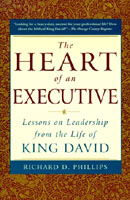 |
| ||||||||||||||||
 |
The Heart of an Executive: Lessons on Leadership from the Life of King DavidRichard D. Phillips
Excerpt: Selection from the Prologue - The Shepherd The executive as shepherd, then, captures what was in the heart of young David, poised at the start of his epic career. In the rest of the Twenty-third Psalm, he goes on to sketch implications as to the tasks thus required.First, he hums his pen to the task of direction. Because of his own Shepherd, David rejoices, "I shall not be in want." For sheep, of course, the issue is safe and rich grazing grounds, and the availability of fresh water. "He makes me lie down in green pastures, he leads me beside quiet waters." So the executive must make decisions and communicate effective plans, monitoring and intervening along the way. Thereby, David muses, "he restores my soul. He guides me in paths of righteousness." To the shepherd, this is the finest reward--that his knowledge and experience and insight direct the flock in the right way--and so he guides them "for his name's sake." Second, David reamed in those fields the importance of the leader's presence in instilling confidence. He sings, "Even though I walk through the valley of the shadow of death, I will fear no evil, for you are with me." In the journeys through the hills, the flocks often had to pass through narrow valleys--places of danger that rightly unsettled the sheep and endangered the whole enterprise. In the shadows of the passes lurked wild animals, and the valleys were the sites of sudden storms and floods. There was menace in the changing scenery, as there often is on today's shifting corporate landscape. The flock thus recoiled in apprehension, instinctively casting their eyes about for a sight of the shepherd. His personal presence gave the sheep assurance, calming and moving them forward because of their trust in his watchful care. This need for trust is the same in human organizations; David's early experience would be repeated over and over, proving that every effective leader must learn to instill confidence and assurance in times of threat and turmoil. How insightful are David's words that follow: "Your rod and your staff, they comfort me." These were the tools of the shepherd's trade and the ever-present symbols of his authority. Indeed, the staff is emblematic of the shepherd himself. It is what he rests his weight upon in weariness and plants in the dirt before each step. Its purpose is primarily for supervising the sheep themselves: the crooked end was bent just so in order to slip around the wayward neck, coaxing the stray back onto the right path. How familiar are the sheep with the sight and the feel of the shepherd's staff. It comforts them, for it assures them that there is someone watching over and drawing them back from the error and folly. The staff is the authority the shepherd wields over the sheep. David's thought here is keen: he himself is comforted by the fact that God wields the staff over him with the care and authority of a shepherd. Followers expect the executive to exercise authority in order to rightly shape behavior, to nudge this one to the left and yank that one back to the right. Especially in times of danger or uncertainty, the follower is comforted by the leader who assertively and wisely wields authority. So too must he wield the rod, a short and blunt weapon. Just as sheep were comforted in the valley of shadows to see the shepherd ready to strike and defend. So also do men and women today look to the executive to wield power to protect and defend. "Your rod and your staff," David reflects, "they comfort me." These, then, were the first reflections of young David upon his experience in the fields. The shepherd stands among the sheep, making the journey with them, providing direction, wielding authority, and exercising might for their defense.
It is interesting how David has now expanded the scope of his psalm far beyond the needs of the animals he himself was serving. Enlarging on his theme, he expresses a distinctively human need, one so vital that he turns to God for its fulfillment. No doubt, this was what he was trusting the Lord to do--to vindicate and recognize the faithful service of His follower, so overlooked and despised among those of his fellow men who looked down on the lowly state of a mere shepherd. Followers do look to the leader for vindication and recognition, even so large-hearted a follower as David. Along the same line, David sings, "You anoint my head with oil; my cup overflows." In the dry and dusty Palestine of the ancient world, soothing oil for the face and head was a blessing rarely bestowed. So also the cup which overflowed with wine, refreshing the parched throat of the sojourner. Rewards do matter (the Bible consistently speaks of faithful service being rewarded) and for David this payment served to validate and appreciate his hard-earned achievement. But it was not merely the reward that was given, but the Giver of the reward that mattered above all. "You anoint my head," he sings, and it is a relationship that he celebrates as much as the reward itself. Finally, David's great psalm closes with a hope that is widely shared by men and women of all ages: "Surely goodness and love will follow me all the days of my life, and I will dwell in the house of the Lord forever." David turns to his own Shepherd with the hope of belonging, of membership in something worthy and meaningful and enduring. It is not David alone whose thoughts rise to such heights. For it is true that people will work for wages and are motivated by recognition and reward. But at the heart of working men and women is the longing--though oft forgotten and sadly despaired of--to participate in something greater than themselves, to belong to a cause that is meaningful and to share in a legacy that endures. David as shepherd could offer his sheep little of this, but turning to the Shepherd of men and women he dared to dream of so great a prospect for himself. This, to David, was the centerpiece of these early and formative reflections on the task of the leader, and it is the highest calling for all those who, like God, stand at the head, not of beasts, but of soul-bearing women and men.
For Jesus, as for David, leadership is defined by these two principles: it is personal, and it is sacrificial service. Personal leadership does not always demand contact with each individual follower, particularly from those executives entrusted with a large organization. But the shepherd knows the sheep and the sheep know him. They are not, to him, a faceless mass. They are not human resources, but people. The leader knows his people--he understands their frustrations and fears, perceives their weaknesses and their strengths; she knows when they must be prodded forward and when they must be brought along still waters. To them he is not a distant calculator of numbers, an obscure maker of policy, but rather their shepherd, their leader. They know his dreams and the principles he holds dear, and they are themselves being shaped by his character and personality. This, above all, is what they know about the shepherd-executive: He lays it down for the sheep. She spends herself for their sake. He can be trusted and believed in because he sacrifices himself for their sake. Here, then, is the young David whom God found and saw as the man after His own heart. Here in Psalm 23 we see him longing not just for success, but also for purpose and meaning; peering within his heart we see both love and self-sacrifice. How strongly would the imprint of these poetic words, this stunning aspiration, be evidenced in the years to follow. No doubt David often fell short of it, particularly in those early days of trial and test. But we can see him singing, softly and intently, words that shaped the self-consciousness of the leader he would later become: "The Lord is my shepherd, I shall not be in want . . . I will dwell in the house of the Lord forever." |
|||||||||||||||||||||
|
All prices subject to change and given in U.S. Dollars. |
All materials contained in http://www.LeadershipNow.com are protected by copyright and trademark laws and may not be used for any purpose whatsoever other than private, non-commercial viewing purposes. Derivative works and other unauthorized copying or use of stills, video footage, text or graphics is expressly prohibited. LeadershipNow is a trademark of M2 Communications, LLC. |
